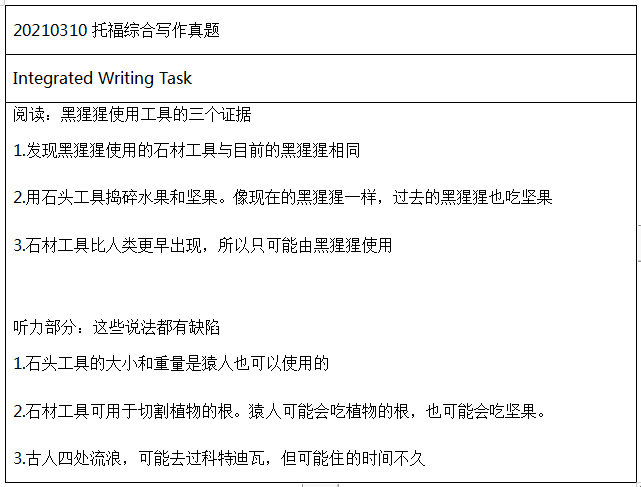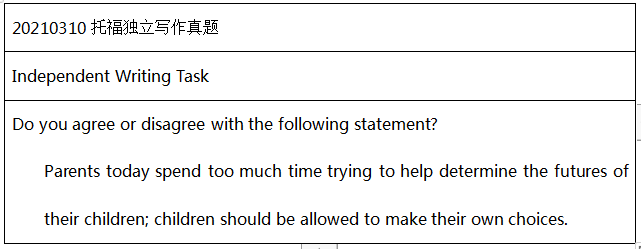

题目解析:
这场考试涉及到了生物和考古,两个话题在综合写作中出现的频率都比较高。TPO中可参考的相关练习有TPO 5、TPO 24、TPO28、TPO 33、TPO 45。
可以类比下列TPO的综合写作
TPO 47 翼龙是否能进行动力飞行
阅读:翼龙不能动力飞行
• 翼龙是冷血动物,无法提供所需要的能量
• 翼龙太重了,无法靠扇动翅膀使自己在空中停留较长时间
• 翼龙后腿肌肉较弱,无法使自己从地面起飞
听力:以上三个说法都有缺陷
• 翼龙体表的皮毛说明它们可能是温血动物
• 翼龙的骨骼是空心的,降低了它们的体重
• 翼龙使用四肢起飞,而不仅仅是后肢

题目解析:
如果有同学看过大量真题,也许会觉得这道题很眼熟。这道题不仅是是2013年7月20日出现过的真题,在TPO中也有类似的题目,讨论家长是否应该过多干涉孩子。同学们可以从自身经历出发,思考当自己家长在为自己做决定的时候,自己是什么样的心理活动,以及对自己带来的效果究竟是正面还是负面,从而给论述提供更多真实的细节。
可以参考以下范文:
The relationship between parents and children has always been a topic of great concern to educators and psychologists. With the development of society and the encouragement of children's independence, more and more people think that parents spend too much time deciding and interfering with children's future, while children should be given more rights to make decisions for themselves. I cannot agree more with this statement.
First of all, over-reliance on parents may not only make children unable to be independent, but even worse, they may not be able to take responsibility for the decisions they make. After the parent makes a decision for the child, if the consequences are not good, the child may put the responsibility on the parent. However, when children leave home and live on their own, they have to bear all the responsibilities for their own actions and decisions. If one still cannot make a decision at this time and take responsibility for the outcomes, then such a person is not an independent and responsible person. We sometimes see on the social news that some people have done wrong but want to avoid responsibility. Such people are often not trained in their childhood to make their own decisions and pay for them, so they cannot be responsible for their own decisions when they become adults.
Secondly, too much interference by parents in their children's decisions may lead to the breakdown of family relationships. In contemporary society, children mature faster than they used to be, both physically and psychologically. If children feel that they are mature enough to make a decision for themselves, then parents should encourage them and offer proper guidance. As long as the parents interfere too much with the child's decision-making power, the child will feel that no matter what he does, he will not be able to earn the trust of the parent. Then, it may even lead to children's rebellious psychology, if parents always deprive children of the right to make decisions for themselves. Children feel that they have not gained the trust of their family members, which leads to disharmony in the family relationship.
It is true that when it comes to major decisions about the future, children may not have enough experience and information to make the right decisions for themselves, but this does not become a reason for parents to interfere with children. In this case, parents should respond to the voice of the child and provide him with some information to make the right decision, rather than forcing their wishes on the child.
In general, I believe that in order to educate children into independent and responsible people, parents should cultivate the ability of children to make decisions for themselves, rather than interfere with them excessively.